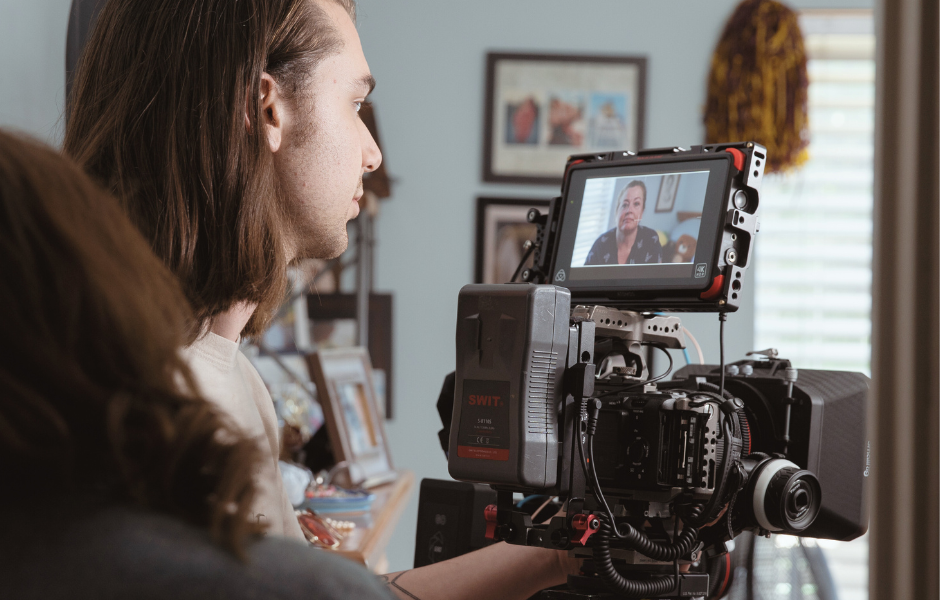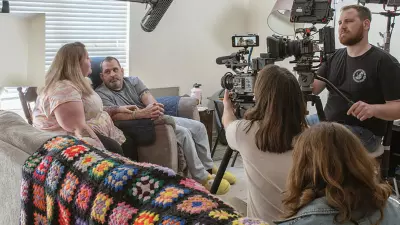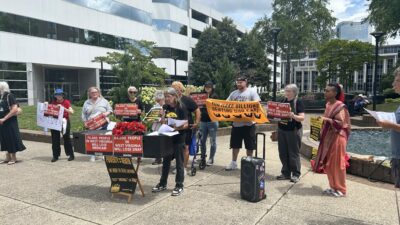
Bailey Kitchen is constantly juggling demanding caregiver duties.
In addition to looking out for her 10-year-old daughter, the 30-year-old North Carolina woman also cares for her mother and father, both suffering from dementia, worsened by alcoholism and substance abuse.
Bailey has been documenting the challenges of caring for her folks on TikTok, where she’s amassed more than 600,000 followers.
While her videos get millions of views, they’ve also prompted condemnation from those who say Bailey is exploiting her parents’ ailments for internet notoriety.
Filmmaker Em Bennett had been watching Bailey’s videos for about a year before she reached out to her. After a short conversation, Bennett decided that she and her crew of documentarians would travel to North Carolina to capture the struggles Bailey and her family face in a more nuanced medium than social media.
Postindustrial talked to the 26-year-old filmmaker from West Virginia, now living in Brooklyn, about her experiences telling the story of a multigenerational family dealing with parents in mental decline. Bennett spoke of what drew her to this topic and the challenges they faced, making sure their telling of the Kitchen family’s story was authentic and respectful.
Postindustrial: What inspired you to create this film?
Bennett: Conceptually, this film came from a question I asked myself after observing Bailey’s family online for about a year. It’s apparent there’s some kind of near-otherworldly tenderness on display, but also moments many would consider totally disturbing.
In the information age, could someone pick up a camera and record their family in moments like these and be a good person? What about an exceptionally decent person, even? First, I wanted to meet Bailey and write a story about her; I certainly didn’t set out to make a film, but with her life on display in mostly video format, the form called for it.
After talking with her for the first time, it was clear she was totally unlike anyone I’d ever met, and her family’s story was unbelievable. It’s important to platform and give a physical body to stories like that. My approach to storytelling is near-folklorish, and I spend a lot of time worrying about mind-blowing stories like this one never getting proper preservation in an ephemeral world.
Postindustrial: For those that might not be familiar, can you explain what a “sandwich caregiver” is?
Bennett: The sandwich caregiving generation represents the growing number of young adults in America who are taking care of both their aging or ill parents and their own young children under the same roof. Our subject’s parents suffered brain injuries, and despite their divorce, live in the same home to maintain care from Bailey. Bailey’s 10-year-old daughter Lilly is also featured in the documentary. Simultaneously raising children and supporting sick parents is an overwhelming undertaking, and most sandwich caregivers report experiencing serious burn out and loneliness — some are emotionally broken down or straight up broke from rising costs of living and medical care.

Postindustrial: What were your greatest challenges documenting such a difficult and, at times, heartbreaking, story?
Bennett: Safeguarding our subjects was paramount. We were filming brain-damaged adults in their safe spaces. Bailey’s dad, Scott, has alcohol-induced dementia and his brain would reset about every 10 minutes.
We were asking extremely personal questions to overworked caregivers with huge cameras and everyone had to be mic’d. I decided immediately to mic everyone early and let the cameras roll and forego any overt slating or cutting.
I set out to take an ethnography-first approach, embracing both intense observation and my own recipe for advocate-ethnographic participatory journalism — meaning I practiced both personal/narrative immersion and objective, classic interviewing methods. With a story as sensitive as gaining back a formerly-abusive father only through his memory loss and turning that journey into a monetized, online venture, it needed to be told consensually with the help of the subjects.
Navigating how to interview the family when it came to Scott’s story was especially difficult. Despite a total personality 180 after falling ill with dementia, and though he will never remember the type of person he used to be, everyone else remembers.
Asking Bailey a question like, “Do you ever wonder if you keep your dad under your roof so you can have him for online content?” or asking Bailey’s mom what it’s like to remember the death of their son while Scott is free from that — her answer was that she wishes her brain injury was more serious so that she could forget, too. Questions like that are painful to ask out loud.
By the end of the first full day of interviews, our whole crew was crying. That’s not an exaggeration. And we’ve got a few big, tough looking dudes on this project. This totally unconventional family had us in shambles.
Consider making a contribution toward the completion of this film by visiting their crowdfunding page.







